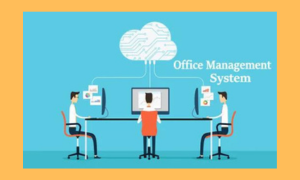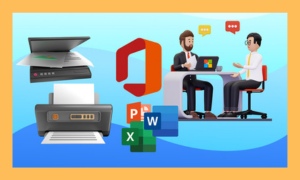Office management is a crucial part of any organization. It involves planning, organizing, and coordinating administrative activities to ensure smooth operations. Office managers are responsible for managing the day-to-day operations of the office, including supervising staff, managing budgets, and ensuring that office equipment is well maintained. They also play a crucial role in developing and implementing office policies and procedures to improve efficiency.
To become an office manager, one needs to possess certain essential skills and qualifications. These include strong communication skills, organizational skills, problem-solving skills, and leadership skills. A degree in business administration, management, or a related field is often preferred, although experience in office management can also be valuable. Additionally, office managers need to stay up-to-date with the latest technology trends to ensure that their office is using the most efficient and effective tools available.
Key Takeaways
- Office management involves planning, organizing, and coordinating administrative activities to ensure smooth operations.
- Essential skills for office management include strong communication, organizational, problem-solving, and leadership skills.
- A degree in business administration, management, or a related field is often preferred, and staying up-to-date with the latest technology trends is crucial for office managers.
Essential Skills for Office Management
Office managers play a critical role in ensuring the smooth operation of an organization. They are responsible for managing the daily operations of the office, supervising employees, and ensuring that all tasks are completed on time. To be successful in this role, office managers must possess a range of essential skills.
Communication and Interpersonal Skills
One of the most critical skills for an office manager is effective communication. Office managers must be able to communicate clearly and concisely with employees, clients, and vendors. They must also be able to listen actively and respond appropriately to feedback and concerns.
Interpersonal skills are also crucial for office managers. They must be able to build strong relationships with employees, clients, and vendors. This involves being approachable, empathetic, and respectful. Office managers must also be able to resolve conflicts and negotiate effectively.
Organizational Abilities
Office managers must be highly organized and detail-oriented. They are responsible for managing schedules, organizing files and documents, and ensuring that the office runs smoothly. They must be able to prioritize tasks effectively and manage multiple projects simultaneously.
Time management is also a critical skill for office managers. They must be able to manage their time effectively and ensure that deadlines are met. This involves being able to delegate tasks to employees and manage their workload effectively.
Problem-Solving and Decision-Making
Office managers must be able to solve problems and make decisions quickly and effectively. They must be able to identify issues and develop solutions that are practical and effective. This involves being able to think critically and creatively.
Office managers must also be able to make decisions that are in the best interest of the organization. This involves weighing the pros and cons of different options and making decisions that are aligned with the organization’s goals and values.
Technology Proficiency
Office managers must be proficient in a range of technologies, including office software, email, and social media. They must be able to use these tools to manage schedules, communicate with employees and clients, and organize files and documents.
Office managers must also be able to stay up-to-date with new technologies and trends in their field. This involves attending training sessions and conferences and staying informed about new tools and resources that can help them perform their job more effectively.
In summary, office managers must possess a range of essential skills to be successful in their role. Effective communication, interpersonal skills, organizational abilities, problem-solving and decision-making, and technology proficiency are all critical for success in this field.
Office Management Qualifications
To become an office manager, there are certain qualifications that one needs to meet. These qualifications include educational background, relevant certifications, and experience requirements.
Educational Background
Office managers typically have a bachelor’s degree in business administration, management, or a related field. However, some employers may accept candidates with an associate’s degree or relevant work experience. It is important to note that having a higher degree or education level may increase the chances of getting hired or receiving a higher salary.

Relevant Certifications
Obtaining relevant certifications can also increase the chances of getting hired as an office manager. Certifications such as the Certified Administrative Professional (CAP) or the Microsoft Office Specialist (MOS) demonstrate proficiency in office management software and administrative tasks. Additionally, the Project Management Professional (PMP) certification can be beneficial for office managers who oversee projects.
Experience Requirements
Most employers prefer candidates with several years of experience in office management or related fields. Candidates should have experience managing people, overseeing projects, and creating and implementing office policies. Experience in customer service and communication can also be beneficial.
Overall, having a combination of educational background, relevant certifications, and experience can make a candidate stand out in the job market and increase their chances of becoming a successful office manager.
Career Pathways in Office Management
Office management is a dynamic field that offers various career pathways to professionals with different backgrounds and skill sets. Whether you are looking for an entry-level position or a senior management opportunity, there are many roles to consider. In this section, we will explore some of the most common career pathways in office management.
Entry-Level Positions
Entry-level positions in office management typically require a high school diploma or equivalent and some relevant experience. These positions are a great way to get started in the field and gain valuable skills. Some common entry-level positions in office management include:
- Receptionist: A receptionist is responsible for greeting visitors, answering phone calls, and performing basic administrative tasks such as filing and data entry. This position requires excellent communication skills and the ability to multitask.
- Administrative Assistant: An administrative assistant provides support to executives and other staff members by performing tasks such as scheduling appointments, making travel arrangements, and preparing reports. This position requires strong organizational skills and attention to detail.
- Office Clerk: An office clerk performs a variety of tasks such as sorting and distributing mail, maintaining records, and ordering supplies. This position requires basic computer skills and the ability to work independently.
Mid-Level Roles
Mid-level roles in office management require more experience and may require a bachelor’s degree or equivalent. These roles involve more responsibility and may require supervising staff members. Some common mid-level roles in office management include:
- Office Manager: An office manager is responsible for overseeing the day-to-day operations of an office. This position requires strong leadership skills and the ability to manage multiple tasks simultaneously.
- Executive Assistant: An executive assistant provides high-level administrative support to executives by performing tasks such as managing schedules, preparing reports, and conducting research. This position requires excellent communication skills and the ability to work under pressure.
- Human Resources Coordinator: A human resources coordinator is responsible for recruiting and hiring staff members, managing employee benefits, and ensuring compliance with labor laws. This position requires knowledge of human resources laws and regulations and excellent interpersonal skills.
Senior Management Opportunities
Senior management opportunities in office management require extensive experience and may require a master’s degree or equivalent. These roles involve strategic planning and decision-making and may require managing multiple offices or departments. Some common senior management opportunities in office management include:
- Chief Operating Officer: A chief operating officer is responsible for overseeing the day-to-day operations of an organization. This position requires extensive experience in office management and strong leadership skills.
- Chief Executive Officer: A chief executive officer is responsible for setting the strategic direction of an organization and ensuring its long-term success. This position requires extensive experience in office management and a deep understanding of business operations.
- Vice President of Operations: A vice president of operations is responsible for managing the operations of an organization and ensuring its efficiency and effectiveness. This position requires extensive experience in office management and strong analytical skills.
Understanding Office Management Salaries
Office management is a dynamic and rewarding career path that offers a variety of roles and opportunities for growth. One of the most important considerations when pursuing a career in office management is salary expectations. In this section, we will explore the salary expectations for various roles in office management and factors that affect compensation.

Salary Expectations by Role
According to Salary.com, the average salary for an office manager in the United States is $84,724 as of March 26, 2024. However, the salary range typically falls between $73,754 and $97,342. It is important to note that the salary for an office manager can vary depending on several factors, including location, industry, and years of experience.
Other roles in office management, such as administrative assistant and executive assistant, also offer competitive salaries. According to Indeed, the average salary for an administrative assistant is $17.94 per hour in the United States. Executive assistants, on the other hand, can earn an average of $30.81 per hour, according to Payscale.
Factors Affecting Compensation
Several factors can affect an office manager’s compensation, including education, certifications, additional skills, and the number of years spent in the profession. For example, an office manager with a bachelor’s degree may earn a higher salary than one without a degree. Similarly, an office manager with additional certifications in project management or leadership may also earn a higher salary.
Location is another important factor that can affect compensation. According to Indeed, office managers in cities such as New York, San Francisco, and Boston tend to earn higher salaries than those in smaller cities or rural areas.
Negotiating Your Salary
Negotiating your salary is an important part of the job search process. It is important to do your research and have a clear understanding of the salary range for your desired role and location. You can use websites such as Salary.com and Payscale to research salaries and compare compensation for similar roles.
When negotiating your salary, it is important to be confident and clear about your expectations. Be prepared to discuss your qualifications, experience, and any additional skills or certifications that may justify a higher salary. Remember to also consider other benefits, such as healthcare, retirement plans, and vacation time, when evaluating a job offer.
In conclusion, understanding the salary expectations for various roles in office management and factors that affect compensation is crucial for anyone pursuing a career in this field. By doing your research and negotiating your salary effectively, you can ensure that you are fairly compensated for your skills and experience.
The Role of Technology in Office Management
Office management has evolved significantly in the past few decades, and technology has played a critical role in this transformation. Technological advancements have enabled office managers to streamline their operations, improve productivity, and enhance data management and security. In this section, we will explore the different ways technology is used in office management.
Software Tools
Office managers use various software tools to manage their day-to-day activities. These tools include project management software, accounting software, and customer relationship management (CRM) software. For instance, project management software, such as Trello and Asana, help office managers to keep track of tasks, deadlines, and progress. Accounting software, such as QuickBooks, enables office managers to manage financial transactions, generate invoices, and track expenses. CRM software, such as Salesforce, helps office managers to manage customer interactions, track sales, and analyze customer data.
Automation and Efficiency
Automation is another critical aspect of technology in office management. Office managers use automation tools to reduce manual labor and improve efficiency. For example, they use automated email responders to reply to customer queries, automated appointment scheduling software to schedule meetings and appointments, and automated invoicing software to generate invoices and send them to clients. Automation tools help office managers to save time, reduce errors, and improve productivity.
Data Management and Security
Data management and security are critical components of office management. Office managers use various tools and techniques to manage and secure data. For instance, they use cloud-based storage solutions, such as Google Drive and Dropbox, to store and share files securely. They also use password managers, such as LastPass and 1Password, to manage passwords securely. Additionally, they use antivirus software and firewalls to protect their systems from cyber threats.
In conclusion, technology has transformed office management significantly. Office managers use various software tools, automation tools, and data management and security tools to streamline their operations, improve efficiency, and enhance data management and security.

Developing Leadership in Office Management
Effective leadership is essential for the success of any office management team. A good leader is someone who can inspire and motivate their team to work towards a common goal, while also providing guidance and support when needed. Here are some key areas to focus on when developing leadership skills in office management.
Leadership Styles
There are many different leadership styles, and each has its own strengths and weaknesses. Some leaders are more authoritarian, while others are more democratic. It’s important for office managers to understand their own leadership style and how it affects their team. They should also be willing to adapt their style as needed to meet the needs of their team and the organization as a whole.
Team Building and Motivation
Effective leaders know how to build strong teams and keep them motivated. They understand the importance of clear communication, setting goals, and providing regular feedback. They also know how to recognize and reward their team members for their hard work and contributions. By creating a positive work environment, office managers can help their team members feel more engaged and invested in the success of the organization.
Conflict Resolution
Conflict is inevitable in any workplace, but effective leaders know how to handle it in a constructive way. They listen to all sides of the issue, remain objective, and work to find a solution that is fair and equitable for everyone involved. They also take steps to prevent conflicts from arising in the first place, such as setting clear expectations and addressing issues before they escalate.
In conclusion, developing leadership skills is essential for anyone in an office management role. By focusing on leadership styles, team building and motivation, and conflict resolution, office managers can create a positive work environment and help their team members reach their full potential.
Office Management in Different Industries
Office management is a critical role in any business or organization. The responsibilities of an office manager vary depending on the industry. Here are some examples of how office management differs across different industries.
Healthcare Administration
In healthcare administration, office managers are responsible for ensuring that the medical facility runs smoothly. They manage the day-to-day operations of the facility, including scheduling appointments, managing patient records, and ensuring that medical supplies are stocked. Office managers in healthcare administration must have excellent communication skills, as they often work with patients and medical staff.
Legal Office Management
In legal office management, office managers are responsible for managing the administrative tasks of a law firm. They handle tasks such as scheduling appointments, managing client files, and billing clients. Office managers in legal office management must have excellent organizational skills, attention to detail, and the ability to multitask.
Educational Administration
In educational administration, office managers are responsible for managing the administrative tasks of a school or university. They handle tasks such as scheduling appointments, managing student records, and ensuring that school supplies are stocked. Office managers in educational administration must have excellent communication skills, as they often work with students, parents, and faculty.
Corporate Office Management
In corporate office management, office managers are responsible for managing the administrative tasks of a company. They handle tasks such as scheduling appointments, managing employee records, and ensuring that office supplies are stocked. Office managers in corporate office management must have excellent organizational skills, attention to detail, and the ability to multitask.
In conclusion, the role of an office manager varies depending on the industry. Regardless of the industry, office managers must have excellent communication skills, organizational skills, attention to detail, and the ability to multitask.
Trends and Future of Office Management
As the world evolves, so do the trends and future of office management. In this section, we will explore some of the emerging trends that are shaping the future of office management.
Remote Work and Virtual Teams
With the rise of technology, remote work and virtual teams are becoming more prevalent in the workplace. This trend is expected to continue in the future, with more companies adopting remote work policies. Office managers will need to adapt to this trend by implementing new technologies and tools to manage virtual teams effectively.
Sustainability Practices
Sustainability has become a major concern for many businesses, and office management is no exception. Companies are increasingly adopting green practices to reduce their carbon footprint and promote sustainability. Office managers will need to be aware of these practices and implement them in their daily operations.
Innovations in Office Operations
The future of office management will be shaped by innovations in technology and automation. From AI-powered chatbots to smart office systems, these innovations will transform the way offices are managed. Office managers will need to stay up-to-date with these technologies and adopt them to improve efficiency and productivity.
Overall, the future of office management is exciting and full of possibilities. With the right skills and qualifications, office managers can stay ahead of the curve and take advantage of these emerging trends.

Professional Development for Office Managers
Office management is a dynamic field that requires continuous learning and development. Office managers who stay up-to-date with the latest trends and technologies in their field are more likely to succeed and advance in their careers. Here are some professional development strategies that office managers can use to stay current and competitive in their field.
Continuing Education
Continuing education is essential for office managers who want to stay current with the latest trends and technologies in their field. Office managers can take courses or attend workshops to learn new skills or update their existing ones. Online courses are also available, making it easier for office managers to learn at their own pace and on their own time.
Networking and Professional Organizations
Networking and joining professional organizations can help office managers stay up-to-date with the latest trends and technologies in their field. Professional organizations provide opportunities for office managers to network with other professionals in their field, attend conferences and workshops, and access resources that can help them succeed in their careers.
Career Advancement Strategies
Office managers who want to advance in their careers should focus on developing their leadership and management skills. They can take on new responsibilities, mentor junior staff, and seek out opportunities to lead projects or initiatives. Office managers who demonstrate strong leadership and management skills are more likely to be considered for promotions or other career advancement opportunities.
In conclusion, professional development is essential for office managers who want to stay competitive in their field. By continuing their education, networking with other professionals, and developing their leadership and management skills, office managers can position themselves for success and advancement.

